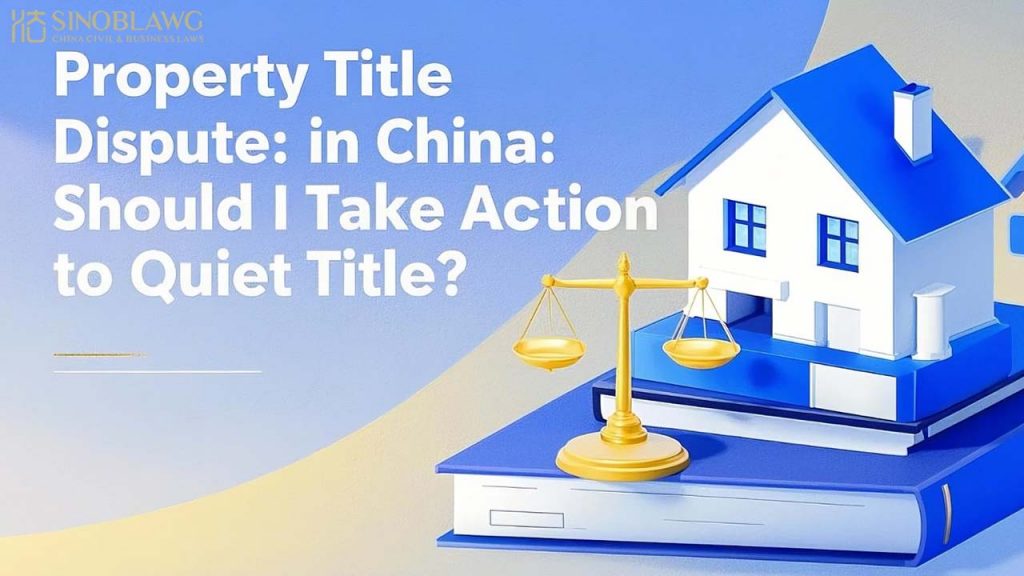As a relatively young country with the concept of rule of law, China has a long way to go before building itself into a ripe rule of law state. In the fundamental field of property laws, there are too many controversies over many legal issues that may well vex a smart mind.
A young colleague in our firm discussed his case with me. It is an interesting situation: a piece of real property (an apartment or a house) was registered in two persons’ names; at a later time, one owner entered into an agreement to buy out the other owner under which it was stipulated that the first-mentioned co-owner would refund the money the latter-mentioned co-owner had contributed in purchasing the property for the latter’s share in the property. The buying party paid the money to the other party, but for some reason, they failed to update the title of the property, leaving the property still registered in two persons’ names. Then the buying party died, and his heirs now wants to inherit his estate in the property.
The primary question is how much share or value the estate is in light of the whole property. Then you come to the question: who are the owners of the property now?
My colleague, and maybe many other lawyers, thought that the property had been sold by one co-owner to the other and related consideration had also been paid up, so the property should now be the estate of the deceased in its whole despite the other registrant on the title certificate. So he decided to take an action to quiet the title of the property or in other words to confirm that the title of the whole property vests with the deceased.
Is that a proper cause of action? or is it proper to take this action of title confirmation?
My answer is NO.
After the enactment of China Property Law in 2007, who is the owner of a certain piece of real property shall only be determined based on the property ownership certificate. Whoever registered on the title certificate (same thing as ownership certificate) shall be presumed to be the legal owner of that property. Based on this, the title and ownership of the property is actually clear and the owners are the two persons registered on the property title certificate (sometimes termed as title deed). There is no ground for taking an action to quiet or confirm or clear the title of the property.
Looking back at the facts of the situation, we should notice that there was a sale-purchase deal concluded between the co-owners which was not completed yet with one step away: removal of the seller’s name from the title certificate. The failure to update the title is a failure in performing a contractual obligation. In other words, in this case, it is a legal issue of performance of contract rather than a dispute over title of the property. If the litigation is framed to confirm title, it is very likely that the plaintiff will fail in the end.
So the proper legal action to take is to sue for real performance of the original contract for sale of seller’s share in the property. This is a different cause of action, requiring a different strategy in framing the litigation. I am not going to go further into that.
One may wonder: in what circumstances should or could a party take an action to quiet or confirm a title in real property? It is not an easy question to answer and may easily spark controversy in legal arena. However, in practice, a typical title confirmation action may arise under following circumstances:
(1) a real buyer use another person’s name in purchasing a property with all money paid by the real owner. For example, foreigners that are not qualified to buy property in China buys property in his girlfriend’s name. Later, a dispute regarding ownership of the property arises. Then the real owner may sue to request the court to confirm that he is the actual owner of the property.
(2) under Chinese Marriage Law, an asset acquired by one spouse ( for example, an apartment registered in one spouse’s name only) during their marriage shall be the community property. Upon a coming divorce, the spouse who is not registered on the title certificate may take an action to confirm his or her title in the property before or during the divorce proceeding in order to prevent the registered spouse from selling the property secretly and conceal the sale proceeds.








Dear Jason,
I have a predicament that I would greatly appreciate any clarity or advice on. After my father (US citizen) passed away years ago, my stepmother (Chinese citizen) immediately turned on me and my sister by trying to take away all property and assets in Guang Zhou. After 2 trials, China’s court has acknowledged my father’s U.S. will twice which finally allowed us to put our names on the property’s title. The will would have given us 50% ownership of the property; however, my sister and I were willing to each give up 5% of our share to our youngest half sister or else she would have been left with nothing. I have been recently informed that I can never sell my share of the property, because my stepmother holds 60% ownership. Is there really no way for my sister and I to sell our property rights? I do not wish to remain connected to my stepmother and paying for a property I am not living in.
Kind regards,
Jennifer
Jennifer, there is no way for you to get out of the predicament except that you sue your step-mother to divide the properties, and most likely that will end up getting the property sold by the court or your stepmother will agree to buy you out. I don’t think it will be a good idea to further complicate the title of the properties by adding another person onto it. Get it split and sell it and get the money out. You can give away 10% to your half sister then. Further inquiries can be sent to my emails.
Thank you for your advice Jason. We already gave 10% to our half-sister which is why my stepmother now holds 60% of the assets. It is unlikely that she will buy us out, because she is refusing to talk even though years have passed. I will take the suggestion under advisement.
Cordially,
Jennifer
Jennifer, is that property is the only property the step mother has in her name? Is she living inside? In any case, the only way for you to realize your interests in the property is to resort to court for splitting of the property. If ok, you may consider buying him out if possible. otherwise the property will end up on auction through court, which generally won’t bring the best offer to you.
Hi Jason,
Thank you for following up from my last response! The property now has my stepmother, my name, and my sister’s name listed on the property. The last time I heard, no one has been living on the property for years.
if no one is occupying the property, then it is easier to split. But you need to take the matter to be solved in court room. Pls send a copy of the title deed to me at my email. We will look into the rough value of the property and give you a legal quote for your referrence.